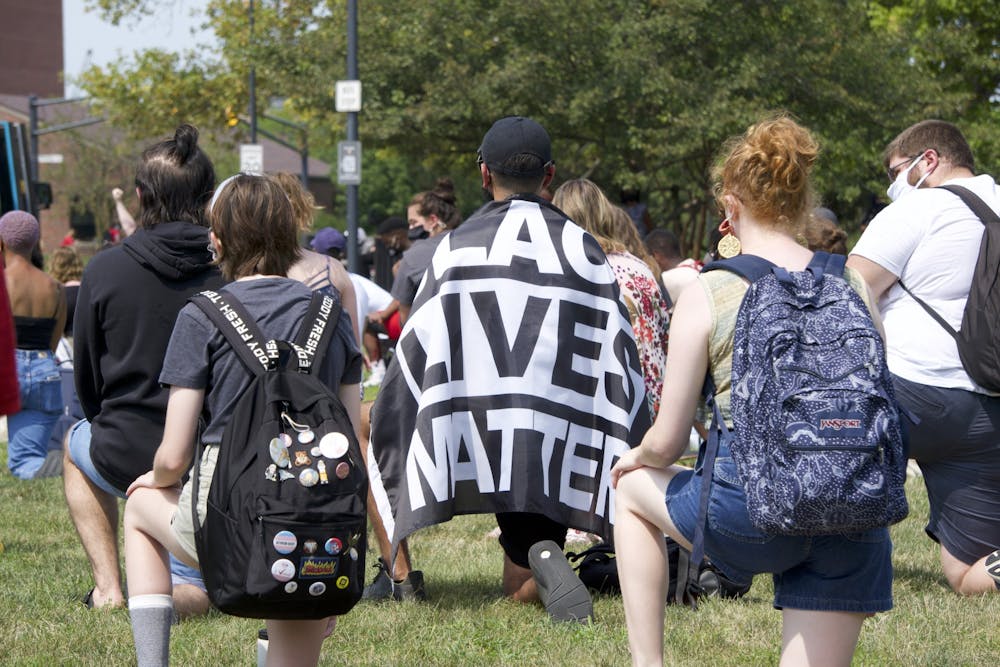Fifty-five years after Taylor Hall’s grandfather marched alongside Martin Luther King Jr. in Boston, Hall, a senior public communications major, found herself protesting against the racial injustice that is still present today.
On Tuesday, Hall was inspired by lessons she learned from her grandfather to take a stand against racial inequality.
“[Activism has] always been something that's been really important to me,” Hall said. “My grandpa just reminds me how to do it effectively and how to not stand for hate, stand for love and follow Martin Luther King’s leadership in being peaceful.”
In the wake of a Kenosha, Wisconsin, shooting of a Black man named Jacob Blake by police officers, demonstrators led by Hall and fellow public communications senior Isabella Gomez met Tuesday afternoon near Shafer Tower to hold a protest for racial justice.
“Whenever something [like this] happens, I feel called to do something,” Hall, who co-organized the event, said. “I’ve been organizing all summer, so once I got on campus, I wanted to do something to let people know that we’re here.”
Junior telecommunications major and Kenosha county resident Ethan Dahlin said having the shooting occur in his hometown made the “Black Lives Matter” protests more personal.
Dahlin said the officers’ actions were “disgusting,” adding that there was nothing that can justify shooting a man in the back seven times. He also said the officers should face repercussions for their actions.
“[The officers’ actions] tell you, bright and clear, that they're not listening,” Dahlin said. “They don't care, and if you're still not believing this system of racism is real at this point, you’ve either got your eyes closed or you’re keeping them shut.”
As of Aug. 26, none of the officers involved have been arrested. Protests and violence have erupted in the city, leading to the Wednesday afternoon arrest of seventeen-year-old Antioch, Illinois resident Kyle Rittenhouse on suspicion of first-degree intentional homicide after two people were killed during the protest, according to an article from the Associated Press.
Hall invited members of the audience, which numbered nearly 100 protesters, to speak on their experiences with racism and the use of force by police, including Democratic congressional candidate Jeannine Lee Lake, who spoke against the policies of her opponent, U.S. Rep. Greg Pence, and President Donald Trump’s administration.
“These people have policies and laws that do not protect brown people,” Lake said. “We must elect good leaders that care.”
Lake pointed out the Muncie Police Department’s decision to add a diversity task force earlier this summer as a sign that the protests have worked. She also encouraged the other attendees to vote “racist leaders” out of office in the upcoming general election.
Gomez, who participated in multiple protests for the “Black Lives Matter” movement in Crown Point, Indiana, said having conversations about race with people who did not share her views on the protests was an important part of improving understanding the issue.
“Having these conversations is uncomfortable, but they are absolutely necessary in order to progress toward the change that we want and need in our society,” Gomez said.
Jim Duckham, director of public safety at Ball State, wrote in an email that effective communication between the police and people helps reduce potential tensions, citing the UPD’s engagement in community forums over the summer.
"As a police chief, I recognize that there are people that have had negative experiences with law enforcement. That is why community policing is so important,” Duckham wrote. “At Ball State, we work hard every day to engage our community in a positive way and will continue to do so."
Duckham also said UPD officers have received “hundreds of hours” of training and have placed more emphasis on “de-escalation, implicit bias, cultural awareness, crisis intervention and First Amendment issues” in the last five years.
Gabriel Tait, assistant professor of journalism, said the larger issue is based on humanity and how people are treated. The number one factor that occurs in these types of incidences, Tait said, was that one party does not have respect or understanding for the other party. The department of journalism created a diversity in media class, which Tait teaches.
“There is an intentionality being made in our department to increase the conversations and thus develop a level of respect for humanity,” Tait said.
When he is teaching the class, Tait said, he offers the students “a myriad of perspectives” to have them question what they see and research the perspectives to understand what they mean to them. Students don’t like to do this because it forces them to “get into the messy.”
“And getting into the messy — it's very uncomfortable for people, but race, culture and identity is messy,” he said.
It is not an option for people to decide if they are going to “be better citizens, more socially conscious citizens” that have diversity, equity and inclusion, Tait said.
Tait said when students come into his class, they “get your boot size” to prepare them for the uncomfortable discussions ahead.
“So, let me know your boot size, and I will get you some boots so we can walk in the mud together.”
Hall said she hopes to keep her activism going in the future through her music and to hold more demonstrations throughout the school year.
“I'd say that it's not a moment. It's a movement,” Hall said. “This is not something I'm just doing now. This is something that, at the age of 19 years old, I decided to dedicate my life to — making changes inside of our society.”
Contact John Lynch with comments at jplynch@bsu.edu or on Twitter @WritesLynch. Contact Grace McCormick with comments at grmccormick@bsu.edu or on Twitter @graceMc564. Contact Charles Melton with comments at cwmelton@bsu.edu or on Twitter @Cmelton144.





